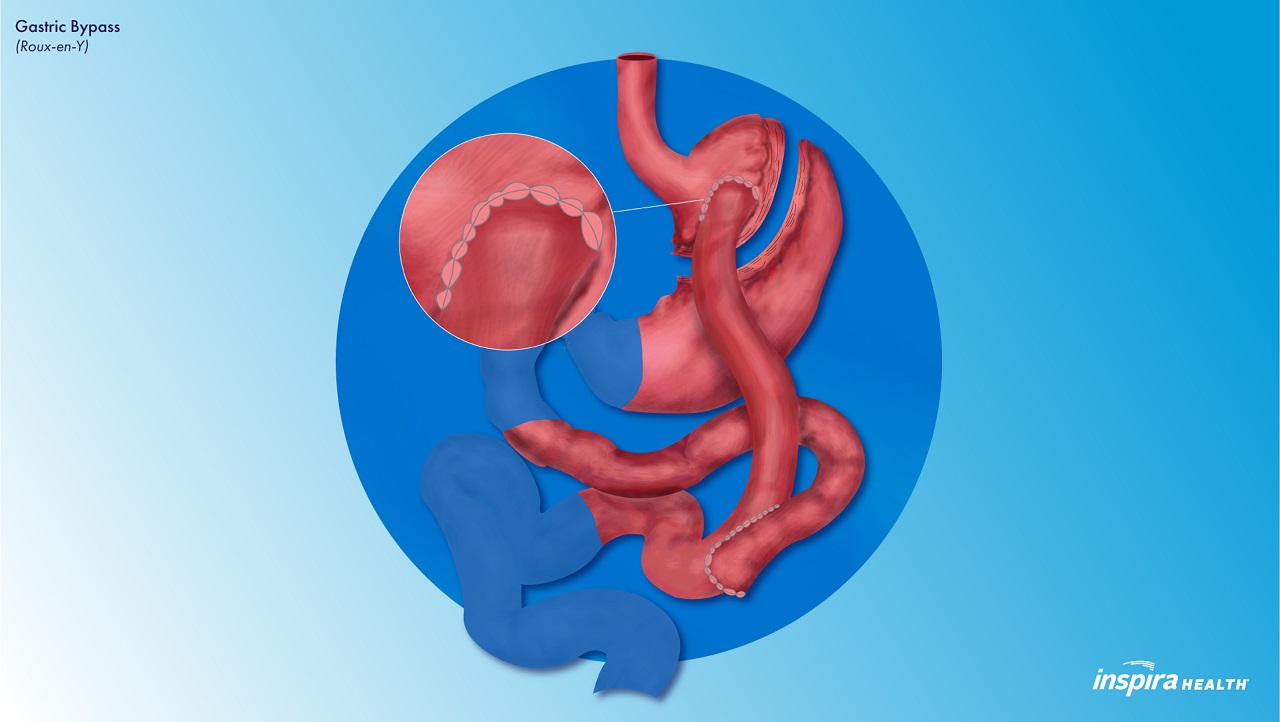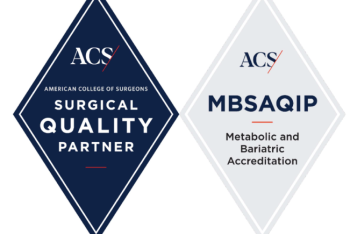Inspira Medical Centers Mullica Hill and Vineland reaccredited as Comprehensive Centers
Read More
Roux-en-Y gastric bypass surgery, also known simply as gastric bypass, may be an option as a primary bariatric surgery or if a previous bariatric surgery did not provide the expected results or is causing some complications such as acid reflux.
Inspira offers minimally invasive gastric bypass surgery to help you reach your wellness goals.

Gastric bypass surgery helps you lose weight by reducing the size of your upper stomach to the approximate size of an egg. This method allows you to lose weight more efficiently by restricting the amount of food you can consume, and bypassing a portion of your small bowel causing restriction of food intake and decreased nutrient absorption. In addition, those who lose weight with gastric bypass surgery may benefit from:
Inspira uses a laparoscopic or robotic approach to gastric bypass surgery, resulting in shorter post-operative hospital stays, fewer complications, less pain and faster recovery than traditional surgery. Our bariatric surgery coordinators, weight management providers, dietitians and post-op support groups ensure that you have a lifetime of support keeping the weight off.
During gastric bypass surgery, your surgeon will make a few small incisions to access your stomach using a laparoscope, a thin tool with a camera attached. The surgeon will then staple the top portion of the stomach to create a small, egg-sized pouch.
Once the egg-sized pouch is created, the surgeon will connect the pouch to part of the small intestine called the Roux limb, forming a “Y” shape and allowing food to bypass the lower, larger pouch of the stomach. Bypassing most of the stomach reduces the amount of fat and calories your body absorbs from the food you consume.
In order to qualify for gastric bypass surgery, you must attend at least one information session and meet with a bariatric specialist to determine your eligibility. You may be a candidate if you:
After you complete your pre-surgical requirements and medical clearances, your procedure will be scheduled. You will stay in the hospital to recover for 1-2 days after your surgery. After the procedure, your doctor, dietitian and support team will work with you to fine-tune your diet and exercise routine. Because gastric bypass affects calorie absorption, it can also reduce the absorption of essential vitamins, minerals and other essential nutrients. Your physician will recommend incorporating daily multivitamins and other supplements into your diet.
The amount of weight you lose and keep off will depend on how closely you follow your diet and adopt long-term lifestyle changes. On average, those who have gastric bypass surgery lose about 50-80 percent of their excess body weight. Excess body weight is measured by subtracting your ideal body weight from your current weight.
You will be out of work for 2-6 weeks, depending on factors including procedure success, complications and status of healing. You will not be able to lift anything heavy for 3-4 weeks after surgery.
After surgery you will be on a staged diet that starts with liquids, slowly working up to soft textures and then solid foods over the 30 days after surgery.
There’s no time like the present to embark on your weight-loss journey, and Inspira Health is here to help. Our virtual information session explains your weight loss options and prepares you for bariatric surgery—as well as what comes next.
In order to qualify for bariatric surgery, candidates must attend at least one virtual or in-person information session. However, some insurance carriers require additional educational classes to qualify.

Inspira Medical Centers Mullica Hill and Vineland reaccredited as Comprehensive Centers
Read More
GLP-1 medications help with weight management and blood sugar control, but they can also slow...
Read More
Dr. Bashian performed surgery on Marcus in October 2024. His wife is also a patient of Dr. Bashian...
Read More